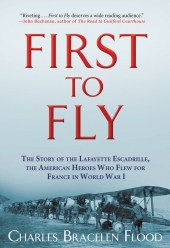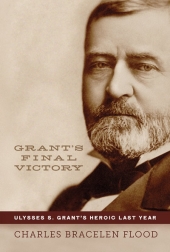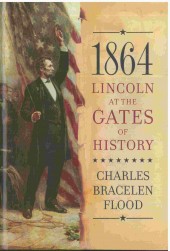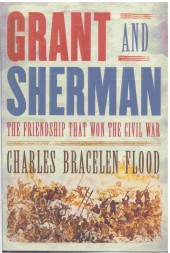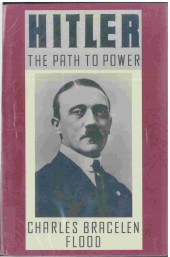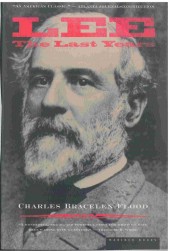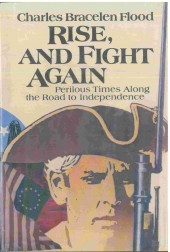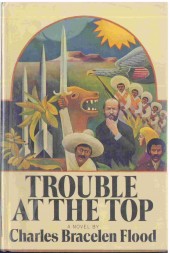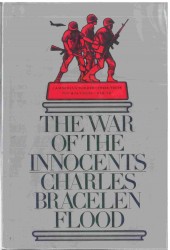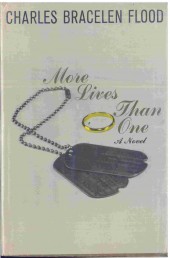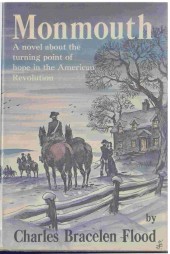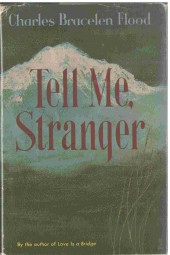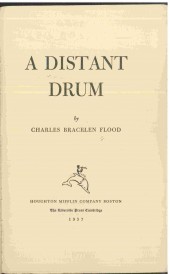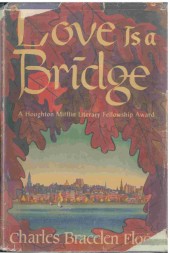A Talk with Charles Bracelen Flood
Ulysses S. Grant is best known for leading the Union to victory during the Civil War, and for his presidency. What led you to focus on the last year of Grant’s life rather than on his wartime service or years in office?
I was fascinated by how little had been written about his last year. In a fourteen-month period, he first lost all his money in a Wall Street swindle. As he began to write his memoirs in an effort to make some money, he was diagnosed as having cancer of the mouth and throat—the result of many years of smoking cigars. Twenty years after he set new standards of military honor by his magnanimous treatment of Robert E. Lee and his men during the surrender at Appomattox Court House, the entire nation, North and South, joined in wishing him well, and in hoping that he could finish his book before he died.
What passed between Grant and Robert E. Lee at Appomattox is one of the most famous moments of the Civil War. You also wrote a book about the last years of Lee’s life. Did you find parallels between their stories?
Each man was the most aggressive general on his side but, after the war, both worked hard for reconciliation. Lee gave a fine example of dignified acceptance of defeat by his innovative and forward-looking presidency of Washington College in Lexington, Virginia, which upon his death five years after the war was renamed Washington and Lee University. In a little-remembered gesture, just weeks after he was inaugurated as president, Grant invited Lee to call on him at the White House. Lee understood that by inviting him, Grant was inviting the South back to the White House. After a visit of some fifteen minutes, the two men shook hands and parted. They never saw each other again.
You weave together letters, newspaper articles, and telegrams to create this narrative. Where did you find them?
One of the great feats of American scholarship is the multi-volume Papers of Ulysses S. Grant, edited by John Y. Simon. Upon Professor Simon’s untimely death, this work has been ably continued by Professor John Marszalek. While I was working on what became my book Grant and Sherman: The Friendship that Won the Civil War, I asked Professor Simon what had been neglected in the treatment of Grant’s life. He replied, “It gets thin, near the end.” In addition to a couple of fairly short but helpful books that cover this period, the New York Times gave virtually daily coverage to Grant’s activities and medical condition from May of 1884 to his death in July of 1885. A real find for me was a book written by his granddaughter, Princess Julia Cantacuzene, titled My Life Here and There. She wrote some splendid descriptions of Grant as she remembered him from her childhood. Julia was nine when he died, and she saw him frequently during the last year of his life. She was at his funeral, and later wrote about it in a vivid and moving way.
Who were Ferdinand Ward and James D. Fish, and what was their role in Grant’s financial hardships in May 1884?
Both men were figures in New York’s financial world. Ward was known as “The Young Napoleon of Wall Street.” They brought Grant, who was naive about money matters, into an investment banking firm they named Grant and Ward. He put all his own money and that of his immediate family into the firm. Showing him and other investors completely false balance sheets, they led Grant to believe that his initial investment of a hundred thousand dollars had swiftly grown to, as he put it, “nigh on to a million.” It turned out that Ward and Fish were running what a later generation would call a Ponzi scheme, more recently practiced by Bernie Madoff. When their financial house of cards collapsed, the true facts became known: Grant and Ward owed its investors sixteen million dollars and actually only had assets of sixty-seven thousand dollars.
How did the public react when they learned that Grant had been swindled?
Most people were sympathetic, and a number of individuals sent him some money. One of his veterans accompanied a check with a note saying, “General, I owe you this for Appomattox.” But there were those who thought that as a partner in the firm he must have known something of what was going on, and that he was guilty of financial negligence. Both Ward and Fish ended up serving prison terms.
Many people might not know that one of the men closest to Grant in his final year was Mark Twain. How did the two first meet, and what was their relationship?
Grant and Twain already knew each other, but by 1884 they were the two most famous men in America. Twain had published his Adventures of Tom Sawyer and was about to publish his Huckleberry Finn, and Grant was on his way to being the most photographed man of the nineteenth century. In his effort to make some money, Grant was already writing some articles about his Civil War battles and campaigns, and had decided to expand these articles into a book that would be called Personal Memoirs of Ulysses S. Grant. At that point Twain appeared and offered to publish the book himself. He offered Grant very generous terms, but thought that the book would make a big profit. What Twain did not expect was that Grant, now suffering from cancer, could sit down every day and write an average of seven hundred and fifty words, words that gave the American public an immensely compelling story of the most convulsive event in the nation’s history. When Twain saw what Grant was producing, he saw that it had remarkable literary quality. He compared it to Caesar’s Commentaries, saying this: “The same high merits distinguished both books—clarity of statement, directness, simplicity, manifest truthfulness, fairness and justice toward friend and foe alike and avoidance of flowery speech...General Grant’s book is a great, unique, and unapproachable literary masterpiece. There is no higher literature than these modern, simple Memoirs. Their style is flawless...no man can improve upon it.”
How did the public react to the news of Grant’s terminal throat and mouth cancer?
In contrast to Grant’s family and friends, the public did not learn of it until some months after the diagnosis was made. One of the most striking things about the reaction was that so many in the South, including Confederate veterans, joined the North in wishing him well in this painful crisis. On the occasion of his sixty-third birthday, he received this message from the Confederate Survivors’ Association, meeting in Augusta, Georgia: “Remembering him as the generous victor...do we, standing by the graves of our Confederate dead, respectfully tender to General Grant sincere and profound sympathy in this season of his direful extremity.” Every day, crowds gathered outside Grant’s house in Manhattan. A reporter from the New York Tribune approached a Union Army veteran, a countryman who was missing an arm and limping along on a cane, and asked him why he was there. The man answered, “He’s my old commander and I love him. When the Battle of the Wilderness was over and the Rebs had taken to their heels, I was a-lying in a shady spot I had a-crawled to, when the General rode by. My arm and leg was a-hanging by a thread and as he passed me I shouted, ‘Hooray’ and the General’s face lit up with a smile of joy and sadness. That was my last battle and I never saw him again.”
One of the most interesting things about Grant’s last months was the many letters he received from young people who had not been born when he was fighting the battles that had preserved the United States as one nation. Marie Matalina Casagrande, a student of the Fifth Ward Industrial School of the Children’s Aid Society of New York, wrote him this: “We know how you are, because all of our boys in school are either news-boys or boot-blacks, and the news-boys of course read it in the paper...I buy a paper every night just to see how you are. Last night, I was so glad to read you had gone for a drive [in Central Park]. Then we all of us, the big ones I mean, study History, and we know what you did for us, before we were born. I am an Italian girl, most all of us are down here in this school, but there are other children too. Some German, some Irish, and some colored children, but we all love you, and pray for you, with all our hearts and souls.” A little girl from St. John's, Michigan, told him this: “I shall send you a Birthday card...I shall buy it with the money I have earned. Mama says it is not a real present if you ask papa for the money to buy it with. I shall put my name on it so you know it is from me for I suppose you will get a great many. Good bye dear General Grant. I love you very much and wish I could do something to make you well.” That was echoed by a girl from Louisville who closed her letter with, “I hope you won’t suffer a bit. General Grant please accept the best wishes and love of this little Louisville girl.” In addition to general compassion, Grant’s race with time to see if he could finish his memoirs before he died brought out the American instinct to root for the underdog.
Considering the treatments available a hundred years ago (brandy injections, cocaine throat sprays), the fact that he lived so long after his diagnosis seems surprising. One person you quoted suggested that Grant’s drive to finish his memoirs kept him alive. Do you think this was the case?
Grant’s famous wartime determination—Lincoln said of him, “When Grant gets possession of a place, he acts as if he had inherited it”—was fully on display during his final months. He spent the last five weeks of his life in a cottage at Mt. McGregor, New York, in the hills above Saratoga Springs. Working hard to finish his book, he told all those around him that completing it was his overriding priority, and told his son Frederick, “This is now my greatest interest in life, to see my work done.” Pushing himself to the end, he completed his book, and died three days later. Mark Twain learned of his death two hours after it occurred, and wrote in his notebook, “I think his book kept him alive several months. He was a very great man and superlatively good.”
Grant dedicated his memoirs to “the American soldier and sailor,” hoping that including both the Union and the Confederacy in his dedication would “serve a purpose in restoring harmony.” Did Grant’s memoirs contribute to unifying the country?
They did indeed. The combination of his death and his book brought to fruition what he said in its last two pages: “I feel that we are on the eve of a new era, when there is to be great harmony between the Federal and Confederate. I cannot stay to be a living witness to the correctness of this prophecy, but I feel within me that it is to be so.” One of Grant’s appeals to the nation had been his saying, “Let us have peace,” and this was soon acted out at his massive funeral procession in Manhattan. Over a million people lined the streets to see his coffin go by. In addition to seeing an honor guard of twenty United States Army generals, the crowd also saw an open carriage in the parade in which sat two former Confederate generals, Joseph E. Johnston and Simon Bolivar Buckner. Grant’s widow, Julia, had asked that they be included because she knew that was what her beloved “Ulyss” would have wanted.
Although your book is about the last year of Grant’s life, there are many references in it to moments earlier in his career. Do you feel some of these should be better known?
Yes. For example, as president, in 1870 he signed the bill that created Yellowstone National Park. By doing that, Grant created the American national park system, the world's first. Near the end of his second term, in his final Annual Message to Congress, now known as the State of the Union Address, he took the unprecedented step of apologizing to the Congress, and through them to the nation, for his failings as president. He said, “It was my fortune, or misfortune, to be called to the office of Chief Magistrate without any previous political training...Under such circumstances it is but reasonable to assume that errors in judgement must have occurred.” He added, however, that he had “acted in every instance, from a conscientious desire to do what was right, constitutional within the law, and for the very best judgment of the whole people.”
Yet another aspect of Grant emerges from a study of his Civil War campaigns. Starting as the commander of a regiment of less than a thousand men, within three years he was general-in-chief of an army of more than a million. In addition to displaying an astonishing learning curve, he was a transitional figure in the history of warfare. At Shiloh in 1862, he was galloping back and forth right behind the lines of his infantrymen who were firing at the enemy at close range; by the time he was opposing Robert E. Lee and his Army of Northern Virginia in 1864, he was at his headquarters miles behind the lines, communicating with his corps commanders by telegraph. Far from being a man who simply threw his men away, Grant was a sophisticated leader who took military intelligence to considerable heights. During the last year of the war, he had created and incorporated into his headquarters at City Point, Virginia, a sixty-four-man Bureau of Military Information—a highly effective intelligence-gathering unit.
On the personal side of his life, he and his wife Julia lived what the Civil War historian Bruce Caon called “one of the great romantic American love stories.” Grant’s wartime aide Horace Porter recalled that at City Point, “they would seek a quiet corner of his quarters of an evening, and sit with her hand in his, manifesting the most ardent devotion; and if a staff-officer came upon them, they would look as bashful as two young lovers spied upon in the scenes of their courtship.” On May 22, 1875, during Grant's second term in the White House, at an hour when Julia knew that he was busy in his office with affairs of state, she nonetheless had one of the staff carry in to him a message she marked, “The President, immediate.” Grant stopped his work and read this: “Dear Ulyss: How many years ago today is it that we were engaged: Just such a day as this too was it not? Julia” Grant quickly penned a reply. “Thirty-one years ago. I was so frightened however that I do not remember whether it was warm or snowing. Ulyss.”
Since Grant’s death in 1885, his reputation has gone up and down, and now seems to be coming back again. What is your view of this?
Grant was much admired, and rightly so, in the years after his death. There had been corruption during his two terms, but he was never directly involved in it. Except for the years he was president, everyone referred to him as “General Grant,” and thought of him as the general who had fought a war that ensured that the United States would remain one nation, rather than one of two nations, the Confederacy being a nation with legalized slavery.
Then, at about the turn of the twentieth century, a revisionist school of Reconstruction-era history began. The Lost Cause mythology began. One of the unfortunate aspects of this was that a number of Southern-sympathizing scholars decided that in order to further enhance the justly prominent military reputation of Robert E. Lee, it was necessary to portray Grant as a bloodthirsty man who had prevailed only because of his superiority in numbers. As recently as 1992, he was being characterized as a pathological killer. As for his alcoholism, the facts are that during a lonely unaccompanied tour at a remote post on the Northwest Pacific Coast, Captain Grant was drunk on duty while handing out coins to enlisted men on a payday, and his commanding officer gave him the choice of facing a court-martial, or resigning from the Army. Grant resigned; during the Civil War, he was never drunk when the soldiers under his command could have been adversely affected by it.
Lost in all this, of course, were such accomplishments as his and Julia’s immensely successful two-year post-presidential trip around the world, during which Grant so impressed the leaders of both China and Japan that they asked him to resolve a boundary dispute concerning the Ryukyus Islands—something Grant did to everyone’s satisfaction.
In recent times, Grant’s reputation has swung back to what it should rightly be—far from being the racist that some have held that he was. Professor Sean Wilentz of Princeton has pointed out that Grant was the president who did the most for civil rights, during the long period between Lincoln and Lyndon B. Johnson.
What in your opinion is the greatest tribute ever paid to Ulysses S. Grant?
In a speech he gave in 1900, Theodore Roosevelt said that any nation would be proud to have had prominent men such as Benjamin Franklin and Thomas Jefferson. Then he said this: “As we look back with keener wisdom into the nation’s past, mightiest of the mighty dead loom the figures of Washington, Lincoln, and Grant...these three greatest men have taken their place among the great men of all nations, the great men of all time. They stood supreme in the two greatest crises of our history, on the two great occasions when we stood in the van of all humanity and struck the two most effective blows that have ever been struck for human freedom under the law.”
And what tribute do you think would have meant the most to Grant?
Years after his death, Julia Grant wrote this: “I, his wife, rested in and was warmed in the sunlight of his loyal love and great fame, and now, even though his beautiful life had gone out, it is as if some far-off planet disappears from the heavens; the light of his glorious fame still reaches out to me, falls upon me, and warms me.”
